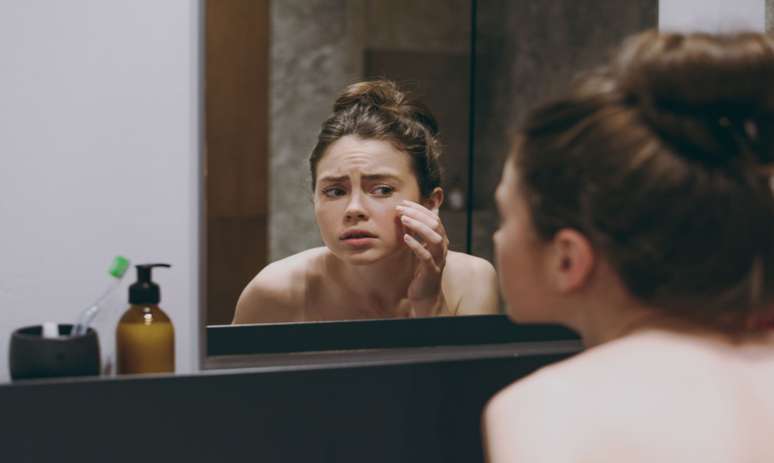Model Izadora Carvalho says she has faced great difficulties in terms of self-esteem and mental health since she was young due to her work
A the influencer Izadora Carvalho He began his career at a very young age, doing his first modeling jobs at the age of 9. He therefore grows among catwalks, flashes and even comparisons, characteristics common to the world of fashion. That’s when the self-esteem and mental health issues began.
“It’s nice to know that we are admired or even inspired by those who follow us. But this also represents a huge burden for ourselves,” reports the ex-girlfriend of the singer Felipe Araújo. She says she started going to the gym when she was just 13 years old, which shows how early her demand for a perfect body was.
In fact, compared to training, Izadora reports that it has become an obsession. “I had a schedule for training, sleeping and eating. For example, when I missed a day of training, I felt very bad, with a guilty conscience, and this ends up affecting us a lot when we don’t have the maturity to do it.” Face it. Today I say that I still charge a lot, but in a healthy way, without sacrificing my mental health, “she says.
Challenges with self-esteem
Before reaching this maturity, Izadora faced major challenges with her self-esteem and mental health. The first was her nose, an annoyance of hers since childhood, which became complex in photographic works focused on the region. Therefore, at the age of 18, the model resorted to remodeling, a minimally invasive technique made with hyaluronic acid. She also took the opportunity to get lip fillers.
“I loved it at the time and I’m still grateful for it today. However, with time and excess, I recently decided to have rhinoplasty because I noticed a change in the size of my nose and a small build-up of acid inside it. “, recalls the influencer. However, this has not solved your self-esteem problem at the root: after all, it is an internal problem.
“It helps at first. Because you feel more beautiful and you think ‘oh now I’m more beautiful, I feel better’, but that vicious cycle of seeking more and more perfection starts again,” says Izadora.
For her, the turning point came when a large number of haters began to talk about her appearance on social media. “It was a difficult period, where I also deactivated my Instagram for a while, I started therapy. And then I understood that the problem was not in me, but in the wickedness of these people in wanting to see me badly. Obviously I started I also” to take better care of myself, of my physical and mental health, because it was a very difficult time for me, and I was only 18,” he says.
Should you resort to cosmetic procedures or not?
Psychologist Katícia Guimarães, Izadora’s therapist, says that the desire to change one’s appearance can have roots in different sources. “Cultural and social influences often play a significant role in this desire. Cultural norms and society’s beauty standards can shape how someone perceives their appearance. This influences what is seen as attractive or undesirable,” he says the professionist.
Additionally, she says, the act of constantly comparing yourself to others can intensify feelings of inadequacy or dissatisfaction with your own image. “This process of comparison is exacerbated in the social media environment, where it is common for people to present idealized and often filtered versions of themselves,” she points out. As a result, it is common to have a growing desire for change, which can lead to cosmetic procedures.
Before carrying out such a procedure, however, a series of factors must be taken into consideration. “First of all, it is essential to reflect on the personal motivations that drive this desire. Analyze whether the desire for change arises from a genuine and intrinsic need or whether it is the result of external pressures”, says the psychologist.
“Additionally, it is essential to have a good understanding of the risks and benefits associated with the procedure in question. Often, outcome expectations can be unrealistic, and speaking with trained professionals can help align and adjust these expectations,” he emphasizes.
Last but not least, the professional emphasizes that it is crucial to consider the current emotional and psychological state. “You need to evaluate whether the desire to undergo the surgery is, in fact, an attempt to resolve a deeper emotional or psychological problem, which will not necessarily be resolved with cosmetic changes alone,” he says.
Dealing with self-esteem issues
For those facing self-esteem challenges, several strategies can help, Letícia says. The psychologist listed 4 points to work on:
- Develop self-knowledge: In this process, psychotherapy can offer insights, tools and strategies to improve self-esteem.
- Avoid comparisons: each individual has their own journey and uniqueness. Remember: comparison can often take away the joy and satisfaction we feel with our story.
- Enhance yourself through hobbies and activities: Engaging in activities that highlight your skills and competencies can strengthen feelings of worth and confidence.
- Practice self-compassion: Give yourself the kindness, affection and patience you would give to a dear friend.
The practitioner reminds us that how we perceive ourselves and how we evaluate ourselves has profound implications for our mental health and well-being. “Working to build and maintain a healthy body image and strong self-esteem is an ongoing process. This may include practicing self-compassion, setting boundaries on social media, or seeking professional support when needed,” he claims.
According to Katícia, in all aesthetic decisions, it is essential that motivations come from a place of self-care and acceptance, rather than external pressures or unattainable ideals. Izadora agrees: “I believe we should do it if we feel like it, the professionals are there for that. But always because we want to and not because of other people’s opinions or pressure. Do it for yourself. Not for what others are.” said.”
Source: Terra
Ben Stock is a lifestyle journalist and author at Gossipify. He writes about topics such as health, wellness, travel, food and home decor. He provides practical advice and inspiration to improve well-being, keeps readers up to date with latest lifestyle news and trends, known for his engaging writing style, in-depth analysis and unique perspectives.









